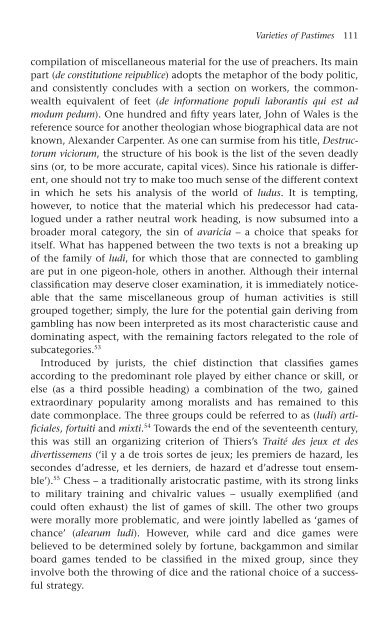Recreation in the Renaissance
Recreation in the Renaissance
Recreation in the Renaissance
- No tags were found...
Create successful ePaper yourself
Turn your PDF publications into a flip-book with our unique Google optimized e-Paper software.
Varieties of Pastimes 111<br />
compilation of miscellaneous material for <strong>the</strong> use of preachers. Its ma<strong>in</strong><br />
part (de constitutione reipublice) adopts <strong>the</strong> metaphor of <strong>the</strong> body politic,<br />
and consistently concludes with a section on workers, <strong>the</strong> commonwealth<br />
equivalent of feet (de <strong>in</strong>formatione populi laborantis qui est ad<br />
modum pedum). One hundred and fifty years later, John of Wales is <strong>the</strong><br />
reference source for ano<strong>the</strong>r <strong>the</strong>ologian whose biographical data are not<br />
known, Alexander Carpenter. As one can surmise from his title, Destructorum<br />
viciorum, <strong>the</strong> structure of his book is <strong>the</strong> list of <strong>the</strong> seven deadly<br />
s<strong>in</strong>s (or, to be more accurate, capital vices). S<strong>in</strong>ce his rationale is different,<br />
one should not try to make too much sense of <strong>the</strong> different context<br />
<strong>in</strong> which he sets his analysis of <strong>the</strong> world of ludus. It is tempt<strong>in</strong>g,<br />
however, to notice that <strong>the</strong> material which his predecessor had catalogued<br />
under a ra<strong>the</strong>r neutral work head<strong>in</strong>g, is now subsumed <strong>in</strong>to a<br />
broader moral category, <strong>the</strong> s<strong>in</strong> of avaricia – a choice that speaks for<br />
itself. What has happened between <strong>the</strong> two texts is not a break<strong>in</strong>g up<br />
of <strong>the</strong> family of ludi, for which those that are connected to gambl<strong>in</strong>g<br />
are put <strong>in</strong> one pigeon-hole, o<strong>the</strong>rs <strong>in</strong> ano<strong>the</strong>r. Although <strong>the</strong>ir <strong>in</strong>ternal<br />
classification may deserve closer exam<strong>in</strong>ation, it is immediately noticeable<br />
that <strong>the</strong> same miscellaneous group of human activities is still<br />
grouped toge<strong>the</strong>r; simply, <strong>the</strong> lure for <strong>the</strong> potential ga<strong>in</strong> deriv<strong>in</strong>g from<br />
gambl<strong>in</strong>g has now been <strong>in</strong>terpreted as its most characteristic cause and<br />
dom<strong>in</strong>at<strong>in</strong>g aspect, with <strong>the</strong> rema<strong>in</strong><strong>in</strong>g factors relegated to <strong>the</strong> role of<br />
subcategories. 53<br />
Introduced by jurists, <strong>the</strong> chief dist<strong>in</strong>ction that classifies games<br />
accord<strong>in</strong>g to <strong>the</strong> predom<strong>in</strong>ant role played by ei<strong>the</strong>r chance or skill, or<br />
else (as a third possible head<strong>in</strong>g) a comb<strong>in</strong>ation of <strong>the</strong> two, ga<strong>in</strong>ed<br />
extraord<strong>in</strong>ary popularity among moralists and has rema<strong>in</strong>ed to this<br />
date commonplace. The three groups could be referred to as (ludi) artificiales,<br />
fortuiti and mixti. 54 Towards <strong>the</strong> end of <strong>the</strong> seventeenth century,<br />
this was still an organiz<strong>in</strong>g criterion of Thiers’s Traité des jeux et des<br />
divertissemens (‘il y a de trois sortes de jeux; les premiers de hazard, les<br />
secondes d’adresse, et les derniers, de hazard et d’adresse tout ensemble’).<br />
55 Chess – a traditionally aristocratic pastime, with its strong l<strong>in</strong>ks<br />
to military tra<strong>in</strong><strong>in</strong>g and chivalric values – usually exemplified (and<br />
could often exhaust) <strong>the</strong> list of games of skill. The o<strong>the</strong>r two groups<br />
were morally more problematic, and were jo<strong>in</strong>tly labelled as ‘games of<br />
chance’ (alearum ludi). However, while card and dice games were<br />
believed to be determ<strong>in</strong>ed solely by fortune, backgammon and similar<br />
board games tended to be classified <strong>in</strong> <strong>the</strong> mixed group, s<strong>in</strong>ce <strong>the</strong>y<br />
<strong>in</strong>volve both <strong>the</strong> throw<strong>in</strong>g of dice and <strong>the</strong> rational choice of a successful<br />
strategy.










